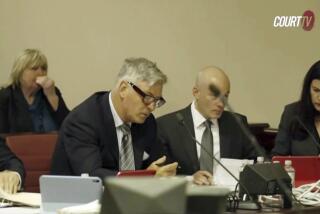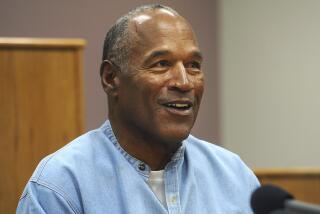Judge Reduces Jury Pool for Simpson Trial
- Share via
Facing O.J. Simpson across the courtroom for the first time Friday, prospective jurors at his civil trial said everyone knows something about the case but insisted they could be fair.
“In my mind the score is zero to zero,” a black man said. He said he suspected there was a police cover-up in the Simpson investigation but that he was willing to hear the evidence anew and reach an unbiased verdict.
Superior Court Judge Hiroshi Fujisaki allowed the man to remain despite strong objections from the lawyer for the family of slaying victim Ron Goldman.
The judge dismissed another black man who said he believed something wasn’t “kosher” in the investigation. The man also described Fred Goldman, father of the slaying victim, as “vindictive” and said he didn’t trust the coroner or the two lead investigators on the case.
The suit by the victims’ families seeks to hold Simpson liable for the 1994 killings of his ex-wife Nicole Brown Simpson and her friend Goldman. Simpson was acquitted last year of murder charges in a criminal trial.
Friday was Simpson’s first appearance since jury selection began in the wrongful-death case Wednesday. He missed the opening sessions because he was in Orange County fighting for custody of his two youngest children. That case is recessed until November.
A few demonstrators yelled “DNA! DNA! DNA!” and some counterdemonstrators yelled back as he arrived.
In the courtroom, a middle-aged white woman said she thought Simpson was probably guilty, probably beat his wife and took too long to seek custody of his children.
Simpson had a pained expression, and his lawyer challenged the woman on her assumption. She said she only knew what she heard on the news and that she could be fair. Fujisaki let her remain on the panel.
Simpson’s lawyer tried unsuccessfully to disqualify a young white woman who said she believed Simpson’s ex-wife was abused and said the bloody glove police reported finding at Simpson’s house was potential evidence of guilt.
She wrote on her questionnaire, “Of all the evidence I saw in the trial, how is he not guilty?” Fujisaki asked her if she could set aside her opinions and decide the case on what she heard in the courtroom. She said she could.
Also approved was a black man who said he believed there was “bungling of police evidence” and that the media stacked the deck against Simpson.
“I felt the blood evidence was handled improperly. But I can be objective enough to sit and listen to the testimony and come to conclusions. I can make my own decision on it,” he said.
The grilling of prospective jurors about publicity in the case began slowly, and the judge acknowledged the breakneck pace he had set in the first days would not continue.
The prospects had filled out questionnaires, and lawyers were following up on their answers. The written forms were under seal.
With Goldman’s family seated in the front row, one jury prospect criticized the victim’s father.
“If you lose somebody I understand you’re going to have strong emotions,” the man said. “You grab on to that for a period of time and it dissipates. But to pursue something with such vigor, it’s almost like an obsession.”
Fred Goldman appeared upset. Simpson maintained a stolid expression and occasionally took notes on a legal pad.
Most of those questioned said they believed the jury in Simpson’s criminal trial was unfairly maligned after its verdict.
“You thought they took a bad rap?” asked Simpson attorney Robert Baker.
“Yes,” said one jury prospect.
Fujisaki told those who passed Friday’s questioning to return for more questioning Oct. 1.
More to Read
Sign up for Essential California
The most important California stories and recommendations in your inbox every morning.
You may occasionally receive promotional content from the Los Angeles Times.













